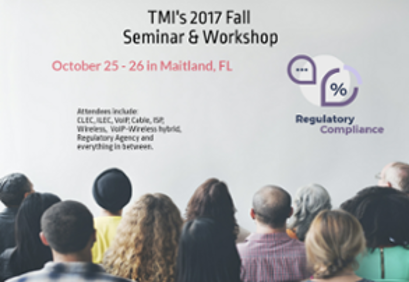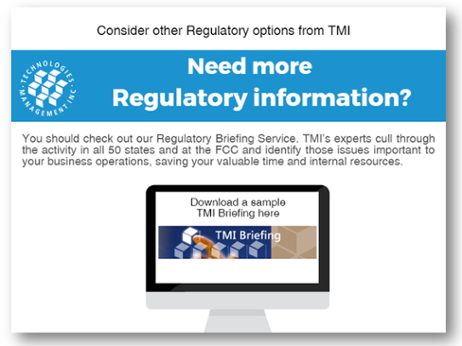 Today: Oklahoma Rules for Resellers, Operator Service Providers, and Payphone Service Providers; FCC Chairman Pai statement on impact of Hurricane Maria; FCC waives numbering rules in areas affected by Hurricanes; FCC status report on Hurricane Maria
Today: Oklahoma Rules for Resellers, Operator Service Providers, and Payphone Service Providers; FCC Chairman Pai statement on impact of Hurricane Maria; FCC waives numbering rules in areas affected by Hurricanes; FCC status report on Hurricane Maria
Oklahoma Reseller, Operator Service Provider, and Payphone Rules
The Oklahoma Corporation Commission is seeking comment on changes to its Chapter 56 (IXC Reseller), Chapter 57 (Operator Service Provider) and Chapter 58 (Payphone Service Provider) rules. The proposed rule changes would allow the three types of providers to detariff their retail services and instead post their terms and conditions of service on a publicly available website. The Commission will consider the adoption of the proposed rules at its October 19, 2017, meeting.
Looking for more details regarding this development? Need deadlines and related information? See the complete TMI Briefing dated 9/21/17
 Hurricane Updates
Hurricane Updates
FCC Chairman Ajit Pai issued a statement on Hurricane Maria’s impact on Puerto Rico, saying it has had a “catastrophic impact” on the island’s communications networks. He noted that over 95% of Puerto Rico’s wireless cell sites are currently out of service. He said, in part, “Unfortunately, getting Puerto Rico’s communications networks up and running will be a challenging process, particularly given the power outages throughout the island. But the FCC stands ready to do whatever we can to help with this task. My thoughts and prayers are with the people of Puerto Rico.”
As it has done for other hurricanes, the FCC waived its numbering rules to allow carriers in the areas affected by Hurricanes Maria and Jose, and the numbering administrators that support them, to port telephone numbers geographically outside of rate centers during the period of service disruption caused by the hurricanes. The waiver applies to all companies that provide service in the U.S. Virgin Islands and Puerto Rico and in any states declared states of emergency as a result of Hurricanes Maria and Jose. The waiver is in effect immediately for a nine-month period expiring June 20, 2018. If carriers are unable to resume service on a normal basis in areas after this period, they may request additional relief from the FCC’s Wireline Competition Bureau. Additionally, because of substantial damage to telecommunications systems expected to be caused by Hurricane Maria, and possibly by Hurricane Jose, the FCC encourages service providers to port telephone numbers geographically outside a rate center to the extent it is technically feasible and to waive call forwarding, message center, and voicemail service charges for affected customers, to the extent lawfully permitted, until the customers’ service is restored.
The FCC also issued its first status report of communications services in geographic areas impacted by Hurricane Maria as of September 21, 2017 at 11:00 AM EDT. The report incorporates network outage data submitted by communications providers to the FCC’s Disaster Information Reporting System (DIRS) which is currently activated for all counties in Puerto Rico and the U.S. Virgin Islands. The FCC reported that:
- Two PSAPs in Puerto Rico are functioning normally and two PSAPs in the U.S. Virgin Islands are unable to retrieve Phase I and Phase II location information for wireless callers and Automatic Number Identification (ANI)/ALI for VoIP Callers;
- Overall, 95.2% of cell sites are out of service in Puerto Rico with all counties having greater than 75% of their cell sites out of service. 48 out of the 78 counties in Puerto Rico have 100% of their cell sites out of service. In the Virgin Islands, overall, 76.6% of cell sites are out of service. All counties have 60% or more of their cell sites out of service;
- Since there are widespread power outages in Puerto Rico and the U.S. Virgin Islands, the FCC has received reports that large percentages of consumers are without either cable services or wireline service.
- Only one television station has reported being out of service; other stations have yet to report.
- No radio stations have reported in DIRS so far.
____________________________
The Regulatory Mix, TMI’s daily blog of telecom related regulatory activities, is a snapshot of PUC, FCC, legislative, and occasionally court issues that our regulatory monitoring team uncovers each day. Depending on their significance, some items may be the subject of a TMI Briefing.
SEE MORE ABOUT OUR FALL SEMINSAR AND WORKSHOP




